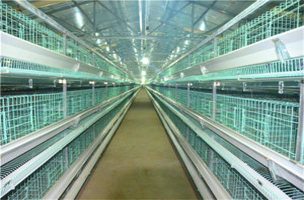Importance of disinfection of chicken farming equipment
- Published in Poultry raising equipment
The use of poultry breeding equipment to raise chickens means that many chickens are placed in the same coop and in the same cage for breeding. In this process, a large amount of harmful gases and substances will be generated. The author recommends that farmers should carry out reasonable cleaning in this case. Regular disinfection of henhouses, chicken layer cages in Ghana, and additional equipment can effectively help remove harmful substances from the henhouse and prevent disease. So what should we do?
Use of any piece of chicken equipment should be disinfected regularly, especially cages. Disinfection is a very necessary job, because chicken cages are very prone to germs, so regular spray disinfection with chickens is an important means of preventing and controlling infectious diseases. To sterilize chickens, choose an odorless, less irritating disinfectant, and several ingredients should be used alternately.

In general, once a week in the cold season is appropriate, twice a week in warm and moderate, hot weather can be day by day. Because of the hot season, the air is humid and the temperature is high. During disinfection, disinfection water should be used after pre-warming the house. The disinfection effect is best when the room temperature is about 25 degrees. The purpose of disinfection is mainly to kill bacteria and viruses in the air, so the spray droplets should be as fine as possible. Do not understand that spraying on chickens is disinfection.
Disinfection is not only good for sterilization and prevention of diseases, but also has the effect of purifying the dust particles in the air, so for this purpose only, you must also disinfect. This work is important and cannot be ignored. Chicken flocks will inevitably continue to have some fragile chickens. These individuals are the target of bacteria and viruses. Eventually, they will become the source of disease infection. Picking them out in time will greatly reduce the chance of large groups of diseases.
Secondly, the staff of chicken farms are important carriers of pathogens. Therefore, those who enter the production area must be strictly disinfected. The staff of each henhouse in the farm are strictly prohibited from stringing henhouses to prevent pathogens from carrying infection between the houses. When necessary, the overalls, caps, shoes, etc. worn by personnel should be left in the original hen house, and replaced at the designated hen house. Work clothes and caps should be cleaned and disinfected. Work clothes and caps should be cleaned and replaced regularly.
In the end, the author reminds the farmers again that in the work of using poultry breeding equipment in Ghana to raise chickens, we must take the flocking and disinfection seriously and must not be careless. If necessary, you can consult the veterinarian to solve the problem. Only in this way can you effectively protect the economic benefits of the farmers. Thank you for your attention.
